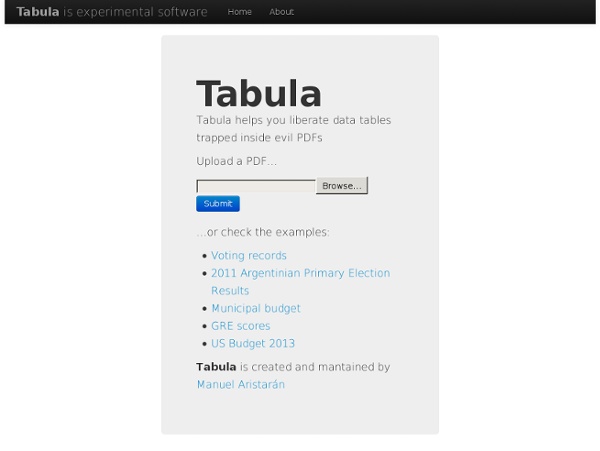



Citadel on the Move > Open Data > Convert My Dataset Here you can transform your data into the Citadel format. Using the Citadel format will allow you to use our Application Generation Tool to make apps and make your data useful to other people. Citadel have created this convertor to make is easy for you to change your excel sheets, CSV files or other information into the Citadel format. To use the convertor, you will need a basic level of technical knowledge and to your data to have the following characteristics: Each entry in the dataset should have a Title, an Address, a Category (e.g. event, restaurant, parking space ect...) and an ID (a number attached to each record) all in separate columns. Each entry must also have a latitude and longitude value.
Access denied The PSI Scoreboard is a ‘crowdsourced’ tool to measure the status of Open Data and PSI re-use throughout the EU. It does NOT monitor government policies, but aims to assess the overall PSI re-use situation, which includes the open data community's activities. Learn more about the methodology and how to update it. The PSI Scoreboard is a crowdsourced initiative in 'beta’ version, which will be evolved based on your feedback. The data is compiled using a combination of internet search and local experts helping us in filling out the scoreboard. Naturally, using a network of experts, there are margins of appreciation in assessing the indicators.
Jacques Bertin’s Reorderable Matrices A device made by French cartographer Jacques Bertin for exploring tabular data, developed in the mid 1960s. More photos on the aviz website, in the flickr photo set by Jean-Baptiste Labrune, and on Page 78 of Nathalie Henry's PhD dissertation. Also see Jean-Daniel Fekete's interview on Jacques Bertin by Enrico Bertini, our interview by Data Stories where we demo a simplified version of Bertin's matrix made by Innar Liiv, and the Web page of Bertifier. Sources: US government to release open data using OKF?s CKAN platform You may have seen hints of it before, but the US government data portal, data.gov, has just announced officially that its next iteration – “data.gov 2.0″ – will incorporate CKAN, the open-source data management system whose development is led and co-ordinated by the Open Knowledge Foundation. The OKF itself is one of the organisations helping to implement the upgrade. Like all governments, the US collects vast amounts of data in the course of its work. Because of its commitment to Open Data tens of thousands of datasets are openly published through data.gov.
5 outils pour créer des tests en ligne Article mis à jour le 8 décembre 2020 par Fidel Navamuel Dans le trousse à outils de l’enseignant ou formateur connecté on trouve bien sûr les questionnaires interactifs ou tests en ligne. Il existe de nombreux services sur le web qui vous permettent de bâtir en quelques minutes un test pour le proposer à vos élèves ou apprenants. 4 Ideas for Defending the Open Data Commons The following post was written by Simon Chignard, author of L’Open data: Comprendre l’ouverture des données publiques. The post was originally posted on Simon’s blog following the launch of the Open Knowlege Foundation French national group, and has been translated by Samuel Goëta from OKFN France. There is a direct link between the open data movement and the philosophy of common goods. Open data are an illustration of the notion of common informational goods proposed by Elinor Ostrom, winner of the 2009 Nobel Prize for economics. Open data belong to everyone and, unlike water and air (and other common goods), they are non-exclusive: their use by one does not prevent others.
Montrer toutes vos compétences grâce à Mozilla Open Badges Cet article a été écrit par Fabio Dell’Anna. Vous pouvez le suivre sur Twitter @fabiodellanna Il n’y a pas que chez les scouts où l’on reçoit des badges. Vous savez ces petits écussons qui vous gratifient d’avoir allumé un feu à l’aide de deux pierres. Mozilla si met aussi… Intégration des stations du réseau ferré RATP Voir les mises à jour à jour en fin d'article La RATP a libéré début juillet 2012 plusieurs jeux de données en opendata sur le site et sur son site Deux jeux de données peuvent être intégrés dans OpenStreetMap: les stations du réseau ferréles points de ventes (débits de tabac, bar, magasins de presse, etc) Je me suis attelé au premier jeu, les stations. La licence: compatible avec